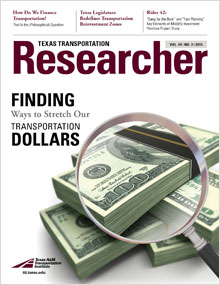Knowledge is only as useful as the benefits it provides.

Agency Director
At the Texas A&M Transportation Institute (TTI), we pursue knowledge through our research. We test assumptions, validate results, and use the state of the art to advance the state of the practice. We work to make the transportation system better, safer and more efficient.
In 2016, the Interstate Highway System will celebrate its 60th anniversary. The system is starting to show its age. Building a transportation network is only the first step; maintaining that network at a level that promotes its safe use is just as important. In 2011, the Texas 2030 Committee identified a projected $170 billion shortfall in revenue needed to maintain our state’s roadway system over the next two decades. If we are to encourage and support further economic growth in Texas, sufficient funding is needed to provide and maintain that viable system.
This issue of the Texas Transportation Researcher looks at how TTI research is helping Texas bridge the gap between funding needs and available revenue. Providing support to the Texas Department of Transportation (TxDOT) and other sponsors to identify alternative financing mechanisms — like mileage-based user fees and transportation reinvestment zones — is one way TTI is advancing the way we think about paying for transportation.
As part of the process of capturing more return on taxpayer investment, the Institute is helping TxDOT identify priority roadway projects to achieve greater mobility on the state’s most congested roadways. Called the Mobility Investment Priorities Project (aka Rider 42), this initiative embraces the core principles of enhancing agency coordination and improving communication with the general public. One example of this emphasis on public engagement is the pilot virtual open house TTI researchers developed for Austin’s Oak Hill Parkway project. The website kept Austin commuters informed about the project and received largely positive feedback. This virtual open house is a great example of how Rider 42 advocates the sharing of knowledge to facilitate system development and operation.
Other stories in this issue explore how rail districts are fostering economic development in the rural areas of Texas and how the Lone Star State can benefit from the expansion of the Panama Canal. TTI’s assistance to the TxDOT Panama Canal Stakeholder Working Group on developing the report, Preparing Texas Land and Sea for the Panama Canal Expansion, is also highlighted.
Through innovative research, outreach and expert testimony, the Institute’s research continues to enhance our collective knowledge of issues that are vital to making the transportation system better for all users.
At TTI, we call that progress.

